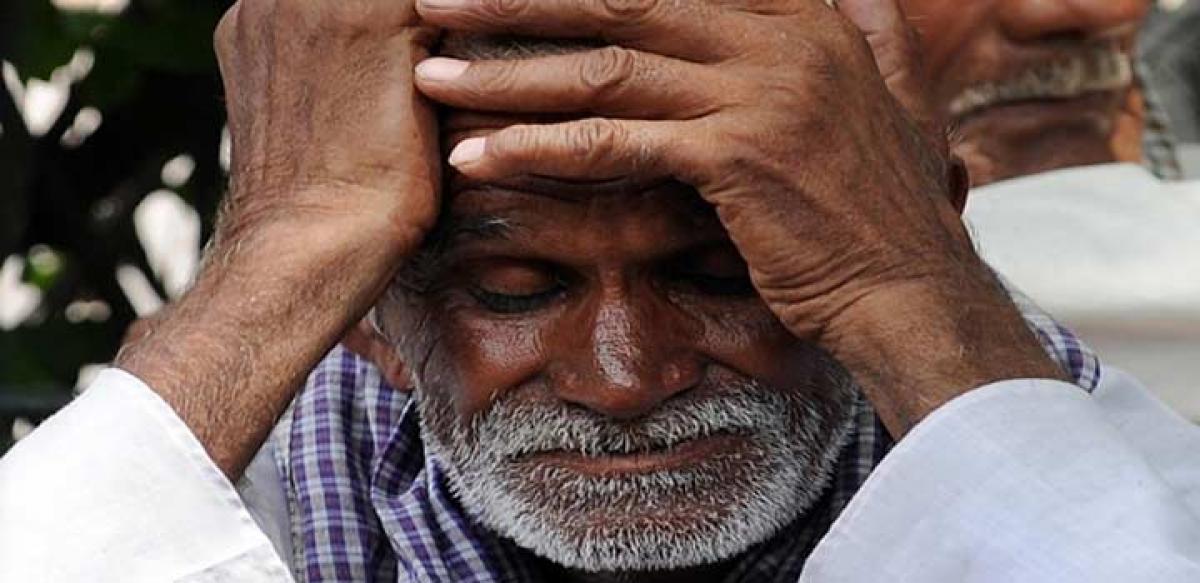The never ending saga of farmer suicides

The never ending saga of farmer suicides. The National Crimes Record Bureau (NCRB), in its 2014 report points out that a staggering 5,650 farmers committed suicides, which was nearly 4.3% of the total suicides in the country.
.jpg) The National Crimes Record Bureau (NCRB), in its 2014 report points out that a staggering 5,650 farmers committed suicides, which was nearly 4.3% of the total suicides in the country. A total of 2,568 farmers’ deaths were reported in Maharashtra, which was followed by 898 in Telangana in the last year alone.
The National Crimes Record Bureau (NCRB), in its 2014 report points out that a staggering 5,650 farmers committed suicides, which was nearly 4.3% of the total suicides in the country. A total of 2,568 farmers’ deaths were reported in Maharashtra, which was followed by 898 in Telangana in the last year alone.
The main causes attributed for farmers suicides are ‘bankruptcy’, ‘family Problems’ and ‘crop failures’, accounting for 20.6%, 20.1% and 16.8% respectively. Nearly 33.4% in Maharashtra and 23.2% of deaths in Telangana were due to ‘bankruptcy.’
The report also reveals that 44.5% and 27.9% of victims were small farmers and marginal farmers, which together accounted for 72.4%. Farmers' suicides have always been a cause of concern, as most families are unaware of the ex-gratia amount that they are entitled to, and in most occasions the recorded number is much less.
The Intelligence Bureau in its report to the Modi government had said that there is an upward trend in the number of farmers resorting to the extreme measure in States like Maharashtra, Telangana, Karnataka and Punjab. In most cases, the main reasons were "both natural and manmade factors”.
Natural factors like uneven rains, hailstorm, drought and floods adversely affect crop yield, while the manmade factors include pricing policies and inadequate marketing facilities resulting in post-yield losses. Declining Agrarian share in the economy is seen as the crux of the problem with close to 15 percent of India's Gross Domestic Product (GDP) coming from the agriculture sector.
Its share which was close to 51.73% in 1954-55 has nosedived to a pitiable 13.94% in 2013-14. Meanwhile, in a significant development although 499 deaths were reported in Telangana State in the last 11 months, this is considerably less than the 900 recorded for the corresponding period in 2014.
It is essentially because of the several measures initiated by the incumbent State Government to check the spate of suicides by aggrieved farmers. According to available statistics, Rs 1.50 lakh each has been paid to the kin of 141 farmers who had committed suicides as compensation besides waiver of crop loans of Rs one lakh that has come to the rescue of an estimated 40 lakh families resulting in an addition of Rs 18,000 crores to the exchequer.
In order to ensure remunerative prices to farmers for their produce, a market intervention of fund Rs.400 crores is also being set up. This is further to the plea made by the State Government to the Centre to treat farmers as a unit as a means to ensure crop insurance coverage.
At present, the farmers in the State are groaning under travails due to delayed monsoon that has resulted in a 15 deficit in rainfall and drought, depleted water resources, failed sowings and crops, mounting debts, pressure of unscrupulous money lenders among several such tragic off-shoots.
This is getting aggravated due to lack of fresh crop loans from banks, which is compelling the farmers to take the extreme step. In Telangana, the share of Agriculture in GDP is declining for the last few years, causing problems for 55.7 percent of the State’s workforce, who virtually depend on agriculture for their sustenance either fully or partially.
However, the sector today facing the challenges, due to declining land productivity, water shortage, un-remunerative prices, high cost of cultivation and changes in climatic conditions and the indifferent attitude of the erstwhile United Andhra Pradesh government. It is time the sector gets a dose of rejuvenation.
In view of the acute water crisis that looms large, the government should take step to declare water bonus for millet farmers who use no irrigated water for their crops.
Searching for piecemeal solutions for food and fodder security ought to be dealt with a comprehensive approach. A way out is patronising with millet cultivation rather than going in for discrete and unviable solutions. (The writer is a Deputy Statistical Officer, Planning Department in Telangana State Secretariat)
By G RAJENDERA KUMAR

